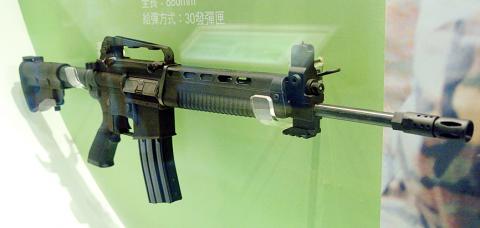More than 1,000 T91 assault rifles were sold in the US in a single day, the Chinese-language United Daily News reported, after the Ministry of National Defense began exporting the locally made weapon.
Made by the ministry’s 205th Armory, the rifles were exported through the US-based Wolf Performance Ammunition, the first Taiwan-made small arms to be sold commercially, the report, published on April 10, cited sources as saying.
An unnamed ministry official was quoted as saying that the rifle sold well in the US market because of its reliability and favorable price point.

Photo: George Tsorng, Taipei Times
The 205 Armory sold “several hundred million rounds” of 5.56mm ammunition to the US military to meet its combat needs during the Iraq and Afghanistan wars, the official was quoted as saying.
The armory’s ammunition acquired a reputation for quality and Wolf Performance Ammunition signed a contract with the ministry to import the rifles on its behalf, the official said.
To comply with laws and regulations of both countries, the rifles are shipped to the US unassembled and include only their major components, the barrel, receiver and handguard, the official said.
After arriving in the US, the importer assembles the components into upper receivers, which buyers can combine with privately purchased lower receivers to make a complete rifle, the official said.
Assembled T91 uppers are sold under the name Wolf A1 for US$599 and are compatible with lower receivers from any AR-15 rifle, such as the US military’s M16 or M4 carbine, the official said.
In the US, lowers and other components are often modified to comply with US states’, legal requirements, which can include bans on magazines with capacity exceeding 10 rounds or weapons capable of fully automatic fire, the official said.
Many US gun manufacturers are unfamiliar with the Taiwanese interest in military affairs, the official said.
Colt Manufacturing Co, the original M16 and M4 maker, relies on US military contracts for high-end weapons, which are not affordable for many gun buyers, the official said.
The opposite is true of many obscure gun manufactures who make cheap weapons and ammunition of poor quality, the official added.
The T91 is built to military specifications, so the quality of Wolf A1 uppers far exceeds its competitors in the same price range, the official said, adding that the alternative short-stroke piston rifle for US buyers is the Heckler & Koch HK416 and its uppers are sold for US$3,000.
The T91 descended from the T65, produced in 1976. The T65 resembles the M16, but has a tougher short-stroke piston system, the official said.
The T65 had initial flaws and in the 1980s it was phased out by the improved T65K2.
The T91 was improved and became standard-issue in 2002, the official said.
The Armaments Bureau was quoted as saying that contractual obligations do not allow it to confirm sales numbers, but the T91 had been given “highly positive” reviews in US-based gun magazines and Web sites.
Many Taiwanese Americans and Taiwanese citizens in the US have expressed interest in the T91, it said.

A preclearance service to facilitate entry for people traveling to select airports in Japan would be available from Thursday next week to Feb. 25 at Taiwan Taoyuan International Airport, Taoyuan International Airport Corp (TIAC) said on Tuesday. The service was first made available to Taiwanese travelers throughout the winter vacation of 2024 and during the Lunar New Year holiday. In addition to flights to the Japanese cities of Hakodate, Asahikawa, Akita, Sendai, Niigata, Okayama, Takamatsu, Kumamoto and Kagoshima, the service would be available to travelers to Kobe and Oita. The service can be accessed by passengers of 15 flight routes operated by

MORE FALL: An investigation into one of Xi’s key cronies, part of a broader ‘anti-corruption’ drive, indicates that he might have a deep distrust in the military, an expert said China’s latest military purge underscores systemic risks in its shift from collective leadership to sole rule under Chinese President Xi Jinping (習近平), and could disrupt its chain of command and military capabilities, a national security official said yesterday. If decisionmaking within the Chinese Communist Party has become “irrational” under one-man rule, the Taiwan Strait and the regional situation must be approached with extreme caution, given unforeseen risks, they added. The anonymous official made the remarks as China’s Central Military Commission Vice Chairman Zhang Youxia (張又俠) and Joint Staff Department Chief of Staff Liu Zhenli (劉振立) were reportedly being investigated for suspected “serious

ENHANCING EFFICIENCY: The apron can accommodate 16 airplanes overnight at Taoyuan airport while work on the third runway continues, the transport minister said A new temporary overnight parking apron at Taiwan Taoyuan International Airport is to start operating on Friday next week to boost operational efficiency while the third runway is being constructed, the Ministry of Transportation and Communications said yesterday. The apron — one of the crucial projects in the construction of the third runway — can accommodate 16 aircraft overnight at the nation’s largest international airport, Minister of Transportation and Communications Chen Shih-kai (陳世凱) told reporters while inspecting the new facility yesterday morning. Aside from providing the airport operator with greater flexibility in aircraft parking during the third runway construction,

American climber Alex Honnold is to attempt a free climb of Taipei 101 today at 9am, with traffic closures around the skyscraper. To accommodate the climb attempt and filming, the Taipei Department of Transportation said traffic controls would be enforced around the Taipei 101 area. If weather conditions delay the climb, the restrictions would be pushed back to tomorrow. Traffic controls would be in place today from 7am to 11am around the Taipei 101 area, the department said. Songzhi Road would be fully closed in both directions between Songlian Road and Xinyi Road Sec 5, it said, adding that bidirectional traffic controls would